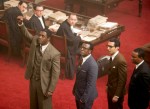Nearly four years ago, Morgan Freeman received acclaim for his role as Nelson Mandela in “Invictus,” a lengthy film about the 1995 South African rugby team that, aside from Freeman’s empowered conviction, remains mostly forgettable. Idris Elba, star of the newest biopic on the always spotlight-worthy leader, faces an eerily similar dilemma.
At almost 2.5 hours, “Mandela: Long Walk to Freedom” should be expected to fill the majority of its plot with the trials and successes of one of the greatest leaders of the 20th century: the first democratically elected president of a terribly divided South Africa. Instead, “Long Walk to Freedom” barely fills any of its plot with such information, portraying Mandela’s persona in an overly simplistic way.
Starting with oddly scripted shots of young Mandela in his childhood as a villager already destined for great things, “Long Walk to Freedom” ages the young leader into his formidable adult self, played with strikingly grandiose talent by Elba. Mandela and his second wife, Winnie (Naomie Harris), guide one another through the South African revolution, fighting through nonviolence and violence alike in dramatically overrun scenes that effectively send out Mandela’s message, but not in the most efficient way.
The film continues into Mandela’s eventual imprisonment, at which point the film dials down its pace to slow, politically oriented turns. But director Justin Chadwick never finds a settled footing in the hero’s legacy to guide him, only following the conventions of historical biopics to little suspense or surprise. It’s very fortunate for the director, then, that Elba and Harris navigate the historical figures’ timeline with a perfected grasp, giving the film enough spark to get by.
What “Long Walk to Freedom” gets right usually comes in the way of its emotional value. Heartfelt and humanistic, “Long Walk to Freedom” grasps the immense relatability that the real man has, purveying a commanding heroism throughout Elba’s performance with relative ease. For each depressing scene of turmoil in the pre-Mandela African country, hopeful shots of a developing nation can impassion the movie with enough zest to sway feelings the other way, at least temporarily.
The status of Elba’s Mandela in the eyes of those around him, including the audience, lends the question of where Chadwick’s direction faulted. Elba appears as a deity to those around him, independent of his actions – a family moment here, an act of adultery there.
It isn’t the most positive take on the leader, especially compared to Freeman in “Invictus,” but it’s one of the most straightforward. A lack of expansion upon the leader’s actions, allowing for little personal development, and furthermore a lack of detailing into the history of the nation as a whole, keeps “Long Walk to Freedom” in too easy a frame of character study to be that interesting.
Of note are two smaller aspects that lead “Long Walk to Freedom” to delicately placed success. An ending song by U2, “Ordinary Love,” is likely to receive some acclaim for a band that is no stranger to critical lauding. And more unconventionally, the makeup work done for Elba’s Mandela is extraordinary, unrecognizably aging the actor into an accurate portrait of the leader by the film’s end.
Enough effective qualities allows “Mandela: Long Walk to Freedom” to pass as a quaint biography on the difficult years of one of the modern era’s most revered leaders without making the years in question appear that difficult. When the next Mandela film tribute is made, perhaps in a couple years’ time, hopefully it will learn from prior works, allowing the complexity of the hero’s demeanor to soar free rather than walk restricted.
